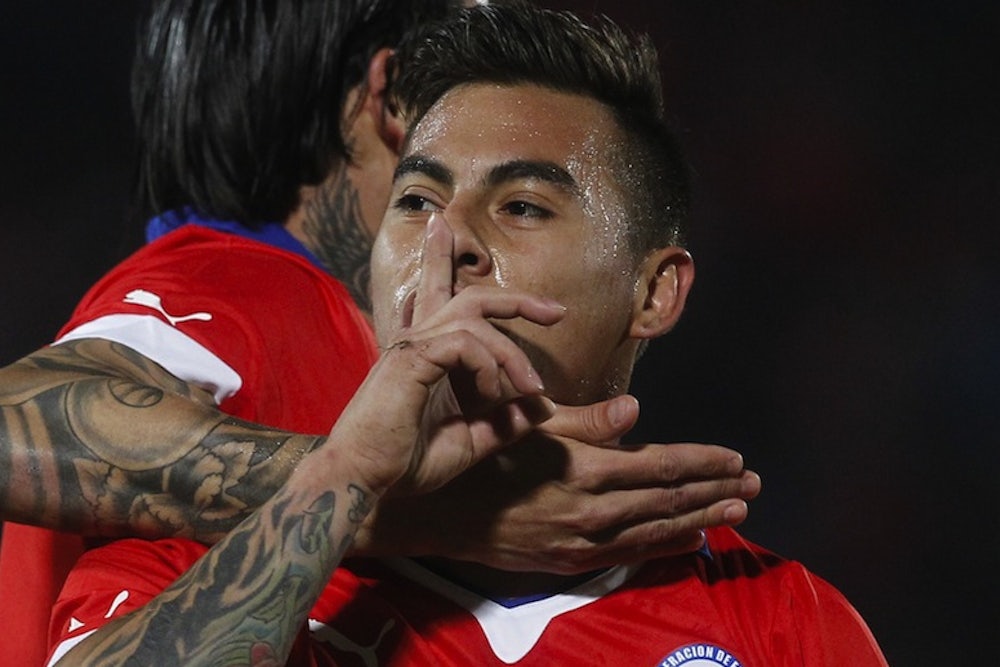Despite today’s loss to the Dutch, there's good reason to believe that Chile’s love affair with its 2014 squad will continue. Chile rarely captures the global spotlight. When it does, it's usually due to a grave event. In the years since the 2010 World Cup, Chile made news for mining accidents, earthquakes, and fires. Political news outlets picked up stories related to its powerful student movement, which refused to allow deeper cuts to education and growth of for-profit educational ventures proposed by the conservative government of Sebastián Piñera. The dictatorship of Augusto Pinochet still casts a long shadow over Chile’s relationship to the world.
This is a long way of saying that it is very important for Chileans to make headlines for football. Among the founders of the South American Confederation, Chile has been outdone by neighboring Argentina, Brazil, Paraguay, and Uruguay. In 1962, as hosts of the World Cup, the national team won third place. Still, it was the Brazilian squad that walked away with the trophy. Analyst after analyst, in response to these defeats, has asked, What is wrong with us?
In recent years, football fans have seen reason for hope. Not just a single star, but a cohort of Chilean players, have enjoyed success abroad. Arturo Vidal and Alexis Sánchez, who play for Juventus and Barcelona respectively, are probably the most famous examples of Chileans excelling with European clubs. In 2012 Eduardo Vargas of Napoli became the first Chilean to score a hat trick in a European Continental tournament. Many players of the national team have played with one another since Chile’s 2007 third place finish in the U-20 World Cup.
The broader social significance of Chile's run in this World Cup remains to be seen. However, certain characteristics have endeared this year's players to the Chilean public. Firstly, Chilean sportswriters often criticize their country's footballers as “psychologically weak” and indecisive. The current squad, for whatever faults it may have, cannot be described as hesitant. Indeed, these players seem a good match for trainer Jorge Sampaoli’s frenetic game plan. Defender Gary Medel’s nickname is “Pitbull.” Arturo Vidal is known at Juventus as the “Warrior.” Chile’s small average stature, indeed making the squad the shortest of all in the tournament, has been a subject of pessimistic speculation. However, it has only served to endear them to their native fan base (and broadened it to those attracted to underdogs). The athleticism required to enact Sampaoli’s attacking style is a great source of pride. The absence of a global superstar, like Messi or Ronaldo, also plays into this sense of Chileans as essentially unified and homogenous. This rhetoric has been important since their defeats in the South American Cup of 1916. Win or lose, there’s a sense this is a collective effort.
This 2014 squad is also the first to have grown up in democratic Chile. At the same time, the economic growth during their lifetimes has been remarkably uneven. For the most part, this is a scrappy group, born in working-class Santiago. Many began playing in barrio clubs that have been central to voicing the demands of the urban working class and integrating members into local politics. (Whether based in neighborhoods, ethnic associations, or trade unions, football clubs were the most common type of civic association throughout the twentieth century.) Arturo Vidal, from La Granja, is one of the many Chilean players that have come up this way. When first playing in Europe he was asked about growing up in poverty. Vidal responded, “On the field that isn’t important. And, moreover, I think the best players are those who come from below. They are proud to come from below. My life has never been in high society.”
There’s plenty of national chauvinism whipped up in a World Cup and it can rear an ugly head in the treatment of immigrants, but there’s also a qualified nationalism that is evident in Chilean celebrations. Chilean political culture is contentious and while the country's Left may be less popular than they were in the 1970s, they’ve maintained a healthy skepticism toward mass culture and populism. Many fans write messages in the white bar of the Chilean flags they wave, demanding education, indigenous rights, or other social reforms. When President Michelle Bachelet wore the shirt of the Chilean Football Federation, she was immediately criticized for the corporate logos on the shirt.
The center-left Bachelet won re-election with ambitious programs to revitalize public education, pensions, and health care. But it's as a woman that Bachelet has the trickiest task during this World Cup. She must appear to care about the fate of the team, but not excessively. She must sympathize with the passion of fans while reprimanding their violent behavior. And she must do so as Chile’s football culture excludes women, almost entirely. The state has done little to support the women’s side and clubs have not sanctioned sexist behavior. The female fan is mocked on social media much the same way she was in the comics a century ago. Just like the squad that she will have to congratulate or console, Bachelet marks a new chapter in the relationship between politics and football in Chile.
